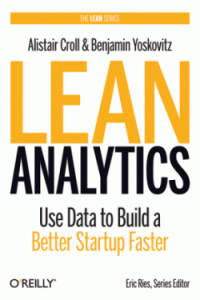 In my quest for ideas to help me with my business, I decided to continue down the Lean Startup path and picked up Lean Analytics: Use Data to Build a Better Startup Faster by Alistair Croll and Ben Yoskovitz. The lean startup craze is in full bloom, and I’ve been trying to get my head around exactly what it means and how it is implemented. Lean Analytics looked as though it could help me along in the process.
In my quest for ideas to help me with my business, I decided to continue down the Lean Startup path and picked up Lean Analytics: Use Data to Build a Better Startup Faster by Alistair Croll and Ben Yoskovitz. The lean startup craze is in full bloom, and I’ve been trying to get my head around exactly what it means and how it is implemented. Lean Analytics looked as though it could help me along in the process.
I came away from the book impressed, especially for a business book focused on startups. It seems as though everyone has an opinion on tech startups these days (me included), but few put in the research, facts and quantitative data to back up their thoughts. In Lean Analytics, Croll and Yoskovitz do a great job of introducing concepts, showing how they have been applied successfully in startup businesses, and providing guidance on how to start implementing lean analytics in your business. There’s a great blend of concepts, case studies and interviews with successful founders throughout the book.
There were a number of concepts presented by Croll and Yoskovitz, but these are the ones that I found most useful:
- The reality of the startup
They start out by covering what it takes to start a company. Startups have been glamorized to the point where everyone thinks they can jump in and quickly get acquired for millions of dollars. Kroll and Yoskovitz debunk this myth and challenge you to consider why you’re starting a business and question if you have what it takes to succeed. It’s a refreshing break from the “everyone should start a company” cheerleading that seems to exist everywhere you read on the internet these days. As they point out, starting a business isn’t for everyone, nor should it be. - The “One Metric That Matters”
They emphasize the discipline on picking the most important metric that matters to your business and focusing on it relentlessly. They rightly point out that this metric will change depending on what stage your business is in, but I have to agree that having focus in your business is an important part of achieving success. - Identifying what business you’re in
Further, they recognize that what you should measure will change depending on your business. They break businesses into six types and then identify the metrics applicable to each. The six types they identify are E-commerce, Software as a Service (SaaS), Free Mobile App, Media Site, User-Generated Content, and Two-Sided Marketplace. In other words, they cover virtually all the most common internet business models out there. Your startup or business idea should fit into one of these buckets, or some combination of them. - Lines in the Sand
Perhaps one of the most helpful pieces of the book is pointing out benchmark rates for the most popular metrics for each type of business. For example, there are benchmarks for a SaaS business for sign-up rates, conversion rates, and churn that will let you know how close you are to industry standards so you can gauge whether you are just right, under optimizing, or over optimizing for a particular metric.
Obviously, I liked the book and highly recommend it for anyone who is contemplating starting a business, has just started a business, or is struggling to find direction in their business, even if it is no longer considered a traditional startup. I know that I took more notes than normal while reading the book that I plan to refer back to from time to time. It also got me thinking about how I’m running my business and sparked a few new ideas to pursue.
I don’t normally recommend many business books, but I’m putting Lean Analytics into my Must Read category. If you’re working in or around the technology industry, it’s a book that you need to have around given the number of recommendations and business insights it contains. It could make the difference between success or failure, which can be an extremely fine line in the world of business these days.

Pingback: My 2014 reading goals and list | Gregg Borodaty